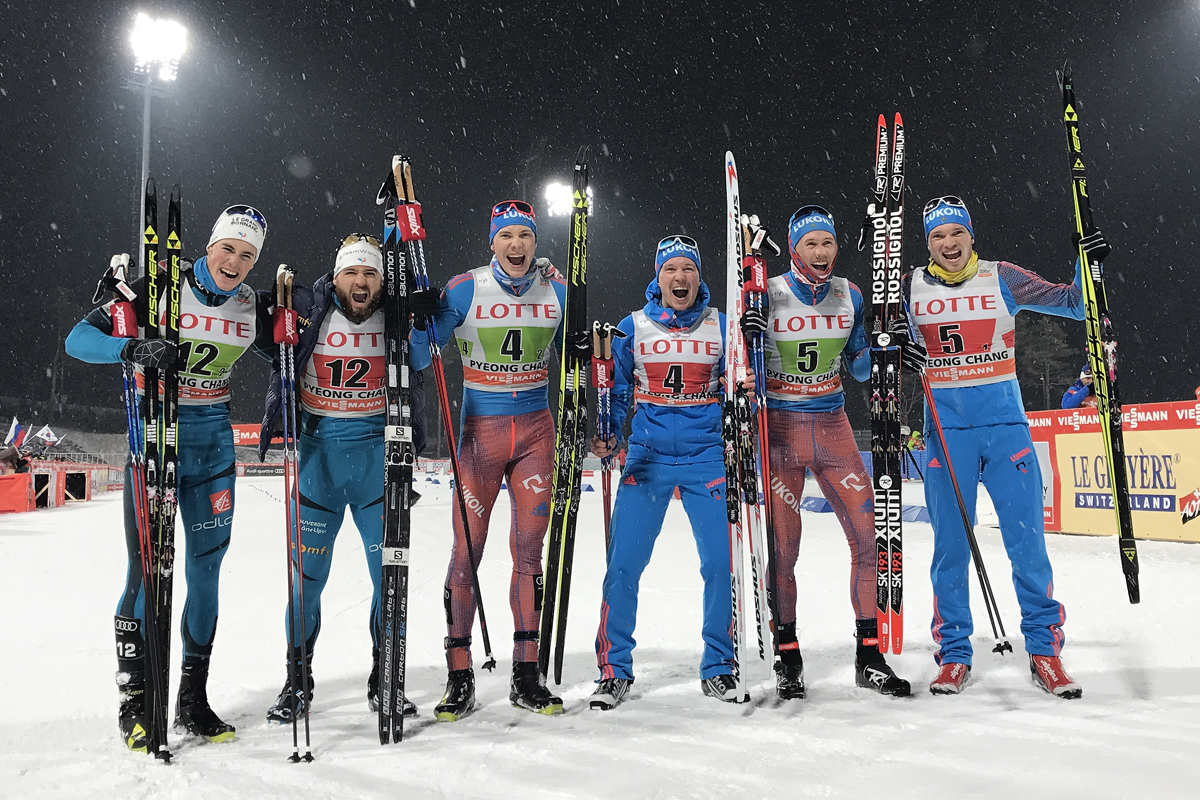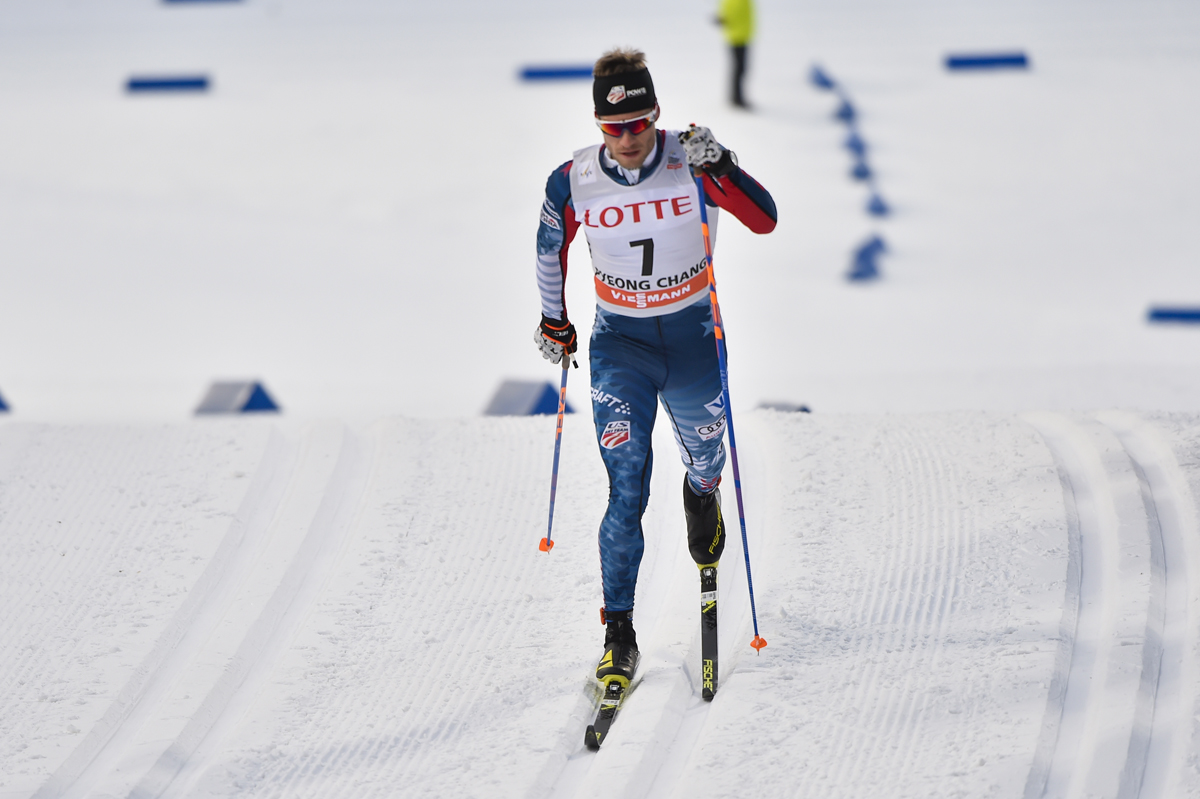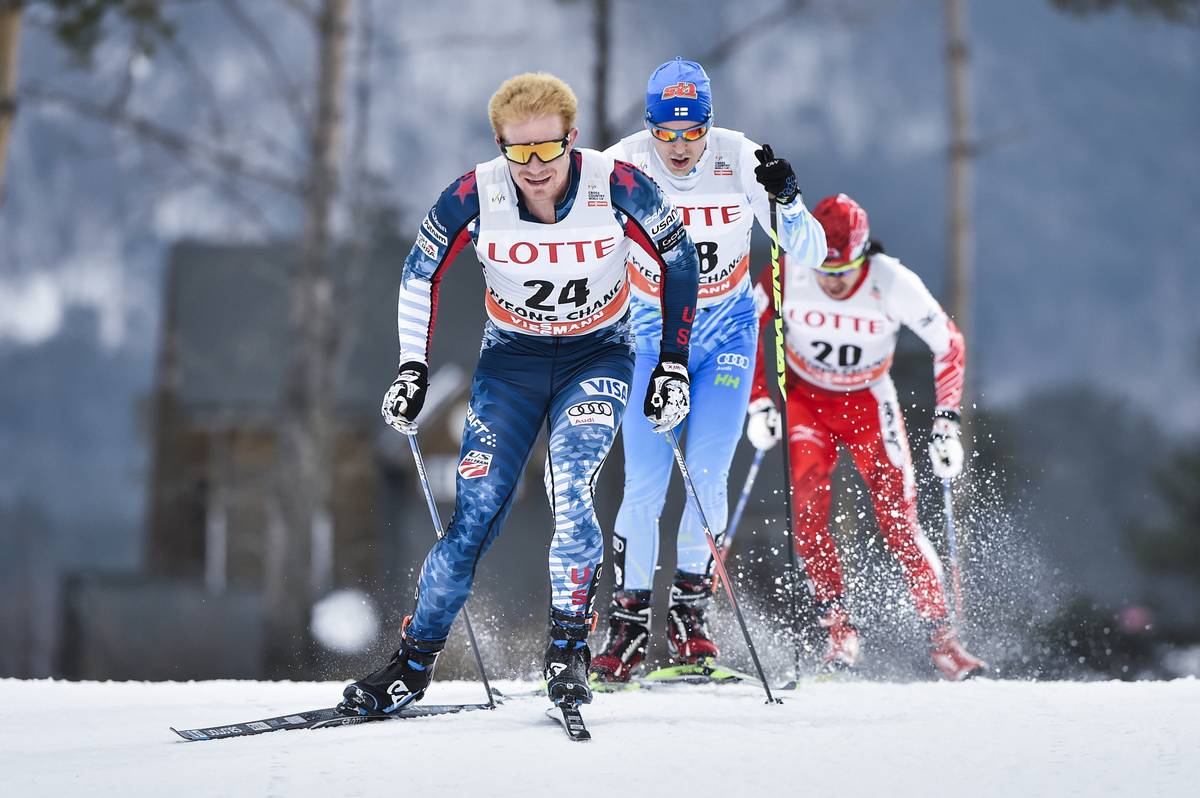
France has never won a World Cup team sprint, neither for men nor women, classic nor freestyle.
And its team will have to wait a bit longer for that time to come. But France was oh-so-close on Sunday, with Baptiste Gros and Lucas Chanavat racing against the Russian duo of Andrey Parfenov and Gleb Retivykh in the men’s 6 x 1.5-kilometer freestyle team sprint in PyeongChang, South Korea.
Chanavat, last year’s U23 world champion in the freestyle sprint, tried to attack on the last steep climb but could not gap Retivykh decisively. Then he positioned himself behind the Russian on the downhill into the arena that will host next year’s Olympic Winter Games, shaking out his arms before tucking into the draft. Coming out of the final left turn, he managed to push up next to him on the finishing stretch, but Retivykh lunged over the line a ski boot ahead for the victory in a time of 19:34.11, with Chanavat just 0.03 seconds behind.
“I did not know in the finish if we won until Andrey told me,” Retivykh told the International Ski Federation (FIS), according to a press release. “It was just as hard skating as it was in classic the other day.”
But the French duo was not too disappointed after narrowly missing the victory.
“Romantic meal to celebrate this first podium of the year! We will bring back a good memory of Korea and be strong for next year,” Gros posted on his Facebook page, according to a translation, at 4 a.m. local time with a picture of him and Chanavat wolfing down two cups of noodles.
“Second in the Team Sprint World Cup in Pyeongchang with my teammate Baptiste Gros (Showing his last drop of rage sinking in his beard)!” Chanavat commented on his Instagram account with a picture of both men smiling. “Next step: be prepared for the world championships in Lahti!”
Russia’s second team of Artem Maltsev and Nikita Kriukov secured the third position on the podium (+5.52).
“It feels absolutely great to be back on the podium,” Kriukov told FIS. “For me it’s a very important step on the way back to the top.”
It was Retivykh’s second victory of the weekend after also winning the men’s invidual classic sprint on Friday, and Russia improved their statistic to become the most successful nation in this event with seven victories in World Cup freestyle team sprints, which have only been contested 25 times so far.
The U.S. Ski Team’s first team, with Andy Newell and Simi Hamilton, finished fourth, 24.23 seconds behind, after being unable to challenge for the podium on the last leg.
The Norwegian team of Daniel Stock and Mathias Rundgreen initially crossed the line before the Americans, but was disqualified for an error on the penultimate exchange only tagging off at least a meter behind the allowed zone. Perhaps hoping a later protest might be successful, they kept skiing and finished the race, with no coach or event official stopping them.
Earlier in the day, Newell and Hamilton had won their semifinal, half a second ahead of the Swedish team of Robin Norum and Gustav Erikson, while Russian’s Parfenov and Retivykh advanced in third (+0.53).
“For me, I felt great in the semifinal, and in the final,“ Newell said on the phone after. “The semifinal was a lot more enjoyable, because it’s a very challenging course with a lot of climbing, and the pace was just relaxed enough that I was able to make moves when I wanted, and control when I wanted to control. I was able to come in and tag Simi in second to start his final leg, we were able to win that semi, and that was great.”
In the men’s race, 14 teams advanced to the final round: the top-four teams from each semifinal heat, plus six more teams with the best times.

In the final, Newell and Hamilton initially stuck with the leaders on the first legs, with each racer having to ski a total of three 1.5 k loops, tagging off repeatedly.
They were only 2.4 seconds back heading into the fifth leg, before Newell lost contact with the top four, which included Norway.
“It was interesting, because there were so many quality distance skiers,” Hamilton said on the phone. “It definitely became evident what their strategy was, especially in the final, they kept the pace really high the whole time. That was tough.”
“In the final it was pretty intense from the get-go,“ Newell agreed. “I know Norway and one of the Russian teams were really trying to push the pace in the first leg. It was pretty challenging, really tough. I felt pretty solid until the last lap, and then I lost contact coming over the hill, and it was kind of windy and snowy out there, so as soon as you lost contact, it was hard to regain it. It was a real leg burner. Unfortunately, that took us out of podium contention, we did end up finishing fifth, and then the Norwegian team was disqualified, so we got fourth. It was a fun day, a great workout, and a great way to practice that event on the Olympic trails.“
Not helping matters was that Hamilton had to race with an upset stomach.
“I don’t know if it’s something I ate or drank, so my energy wasn’t 100 percent, but I still really wanted to race hard,” he said. “It was a good opportunity to get a good result here with diminished fields. I definitely felt better racing than I thought I was going to, but it was for sure a pretty tough day. The course is really hard, it’s long, it’s got a couple of really big climbs, but it skied really well and we had great skis. Andy and I are pretty proud having put in a solid effort, maybe not one of our very best, but a good one for sure. We’re both encouraged by good fitness right now, leading into this little training block before World Champs.”
The team-sprint discipline, which is the newest on the World Cup circuit, is still rarely on the competition schedule. And only two freestyle team sprint races had been held in Asia previously, both in Sapporo, Japan, for a 2006 World Cup and for the 2007 World Championships. But it seems to be a popular format to test new venues.
“I don’t know why they are doing this, but every pre-Olympic weekend at least since Vancouver [for the 2009 World Cup respectively the 2010 Olympics] has always been sprint, skiathlon, team sprint”, U.S. Ski Team distance skier Noah Hoffman said on the phone last week, before his trip to Korea.
Now it was PyeongChang’s turn in the test weekend for the 2018 Olympics. Hoffman did not race on Sunday, but the U.S. was able to start a second squad with Matt Gelso (Sun Valley Ski Education Foundation) and Scott Patterson (Alaska Pacific University).

In their first World Cup team sprint, the duo managed to advance through the semifinal finishing fifth, 13.86 seconds behind the French team that won the heat.
“In the semi, our goal was to simply get in the top four for an automatic advance into the finals,” Patterson wrote in an email. “The pace went out moderate for the early laps and there were enough weak teams later in that it was somewhat easy to secure a high finish. Things spread out a little on the last lap for both Matt and I and we were able to advance even with a close finish for fifth.”
“Scott and I had a hard semifinal,” Gelso wrote. “The pace was very fast from the start so it was very tiring by the end. I felt completely exhausted on the final lap and was concerned with how bad my legs felt that the final would be very bad.”
But despite feeling tired, the duo managed to hang on in the final and improved by two positions on the last two legs to finish ninth (+54.85),
“The final broke apart really early,” Patterson explained. “I think for both of us it was kind of survival mode and see if we could get any last drops out of our muscles. Norway and Russia pushed it hard from the gun. I’m not the fastest starter and got caught up behind a Belarusian [Michail Semenov] so I could not chase quite as much as I wished. By the top of the first hill I was bleeding time. From there it was mostly finding our own battles. The Canadians were in it for a bit, but eventually it was between the Germans [Thomas Wick and Andy Kühne] and us. It was a good fight for both legs and happily we took it in the end.”
Germany placed 10th (+55.13) after Gelso won the finish sprint against Kühne, pushing out of the draft on the finish stretch and raising his left arm in a small celebration as he crossed the line.
“The team sprint today was very fun as Scott and I were able to be in the mix, get into the final, and ski solid through the race,” Gelso wrote. “Not an outstanding result but a good, solid, fun day on the race course with ample opportunities to make things happen.”
Canada’s Len Valjas had the chance to become the first athlete in a long time to win two consecutive team sprints, after winning last month’s freestyle team sprint in Toblach, Italy, with teammate Alex Harvey.
Teaming up with Jess Cockney for Sunday’s race (who had placed 10th in the sprint on Friday while Valjas finished fourth), the duo placed sixth (+4.1) despite a broken pole in the second semifinal, which Newell and Hamilton won.
In the final, Cockney and Valjas were initially able to keep in sight of the leaders, tagging off in ninth in the first exchange, only five seconds back. By the race’s halfway point, they were 10th (+21.0), before falling to the back of the field and losing significant time. They went on to finish in 13th position, 1:38.2 behind the winners.
Valjas and Cockney could not be reached by press time to determine if they had fallen back due to a crash, more broken poles, or were simply running out of energy after racing on a very demanding sprint course all weekend.
The World Cup goes on break for a week before resuming Feb. 18-19 in Otepää, Estonia, with freestyle sprints and 10/15 k classic races, in the last World Cup before 2017 World Championships in Lahti, Finland.
— Gabby Naranja and Jake Ellis contributed
Harald Zimmer
Harald has been following cross-country skiing and biathlon for some 20 years since the Olympic Winter Games in Albertville and Lillehammer. A graduate of Middlesex University London and Harvard University, he now lives near the Alps where he likes to go skiing, snowboarding and hiking. He is a former track athlete in middle-distance running, as well as a huge NBA fan.



